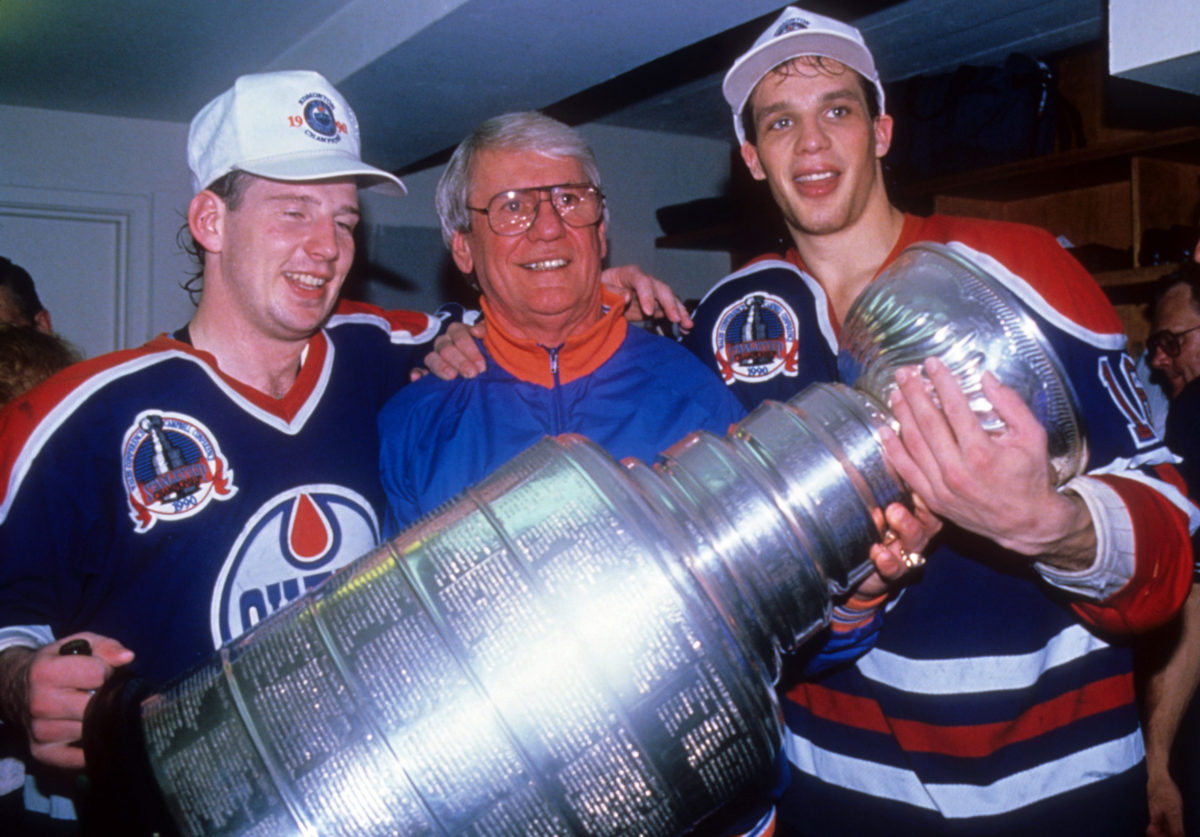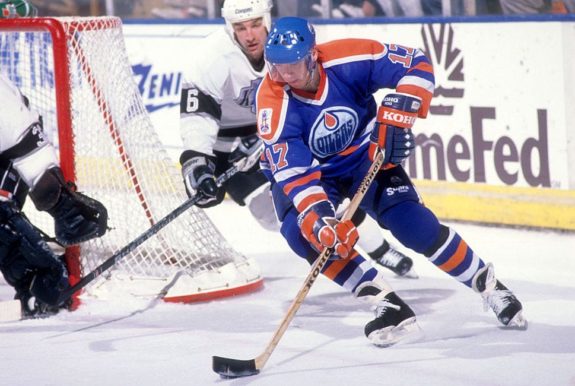The dynasty was supposed to be over.
The Edmonton Oilers run of four Stanley Cups in five years had come to an abrupt end in the opening round of the 1988 Playoffs, at the hands of the generational superstar they had traded away eight months earlier.
Wayne Gretzky and the Los Angeles Kings rallied from a 3-1 series deficit to eliminate the Oilers in seven games, sending Edmonton to its earliest playoff exit since 1981.
Many saw it as a changing of the guard.

The 1989-90 season began with the Oilers’ Vezina-winning goalie, Grant Fuhr, sidelined after undergoing an appendectomy. Four games in, Jimmy Carson, their goals leader from the season prior, demanded a trade.
Oh, and Glen Sather, the Don who had guided the team to Stanley Cup championships in 1984, 1985, 1987 and 1988, had decided to step away as head coach and work exclusively in the role of general manager.
Longtime assistant John Mucker, who in recent years had been functioning as a co-coach, would step out from his predecessor’s shadow, into his shoes, and lead the Oilers to their fifth title in seven seasons, cementing their place among the greatest teams in sports history.
That championship that few saw coming is being recalled fondly in Edmonton, while tributes come from around the hockey world for Muckler, who passed away this week at age 86.
Joining the Oilers in 1981, Muckler, and fellow assistant coach Ted Green provided the technical foundation for Sather’s gamesmanship.
Muckler owned four rings when he took the reigns; a fifth wasn’t so likely. But he would shepherd a talented but tested team through the latter to deliver on the former. The Oilers beat Winnipeg, Los Angeles, Chicago, and Boston, making Muckler the 14th rookie head coach in NHL history to sip from Lord Stanley’s mug. (from ‘Edmonton Oilers beats Boston Bruins to claim fifth Stanley Cup title,’ Edmonton Journal, 05/24/1990)
Trials and Tribulations
The trials of 1989-90 started between the pipes; following a summer marked by a dispute with Sather, Fuhr was first felled by appendicitis, then spent much of the season dealing with a nagging shoulder injury. It came to a head at the end of the season, when the Oilers decided to shut down their four-time champion goalie, handing the keys to 23-year-old Bill Ranford, who had been quite good during the season, but lacked any real postseason experience.
Tribulations came with Carson, the main acquisition in the Gretzky deal who had scored 49 times in 1988-89, forcing his way out of town. Nearly three weeks after the forward walked away from the team, Sather sent Carson to Detroit in a deal that saw Adam Graves, Petr Klima, Joe Murphy join the Oilers.
Muckler still had ample veteran skill at his disposal. This was a roster that included a trio of future Hall-of-Famers in Glenn Anderson, Jari Kurri, and Mark Messier, along with Esa Tikkanen and Craig Simpson up front, as well as Randy Gregg, Charlie Huddy, and Kevin Lowe, rearguard who had been part of all four previous Stanley Cup-winning teams.

But it would be the coach’s success in nurturing young talent and integrating newcomers into the lineup that proved so crucial to Edmonton’s 1990 Stanley Cup run.
The Kids Were Alright
Murphy and Graves joined Martin Gelinas to form the “Kid Line,” an energizing trio that would combine for three game-winning goals during the playoffs. (from ‘Oilers’ Dynasty Ends: Kid line sparked Stanley Cup run,’ Edmonton Sun, 05/22/2015)
Klima scored one of the most famous goals in Stanley Cup Final history — coming over the boards fresh in the third overtime of Game 1 at the old Boston Gardens to wire a shot past Andy Moog after Muckler had sat the mercurial winger for all but one shift since the third period.
Ranford started every postseason game and won the Conn Smythe Trophy as playoff MVP after going 16-6 with a 2.53 goals against average and .912 save percentage (both tremendous figures by 1990 standards).
After playing just 10 regular season games with the Oilers, trade deadline acquisition Reijo Ruotsalainen had the team’s second highest plus/minus rating for the playoffs, logging significant minutes on the blue line.
The Oilers steamrolled over the Bruins (4-1), Black Hawks (4-2) and Gretzky’s Kings (4-0), but barely escaped the Smythe Division semifinal. In a defining moment, Muckler became the first coach in franchise history to lead his team out of a 3-1 hole, with Edmonton winning three straight games to get past an upstart Jets.
Another Run in ’91
Overcoming adversity proved a recurring theme during Muckler’s tenure at the Oilers’ helm. The 1990-91 season saw the defending champs deal with the departure of Kurri and Fuhr being suspended for drug use. (from ‘Fuhr Suspended One Year by NHL for Using Drugs,’ LA Times, 09/28/1990)
In the 1991 Playoffs, Edmonton upset Calgary (in a classic seven-game Smythe semifinal series that ended with another unforgettable overtime goal, this one off the stick of Tikkanen in Game 7 at the Saddledome) and Los Angeles, before falling in the Campbell Conference championship to the Minnesota North Stars.
That offseason, Muckler departed Edmonton (Green would take over behind the Oilers bench) for a job with the Buffalo Sabres, with whom he was named NHL Executive of the Year in 1996-97.
Muckler later coached the New York Rangers and served as general manager of the Ottawa Senators. His last gig was as a senior advisor to the Phoenix Coyotes.
Muckler was feted in 2014 as part of the 30th anniversary celebration of the Oilers’ first Stanley Cup. The 2020-21 Oilers are honouring Muckler with a memorial decal on their helmets this season.
He owns the highest series winning percentage (.857) in Oilers history, and while that may not last, his place in franchise lore is forever.